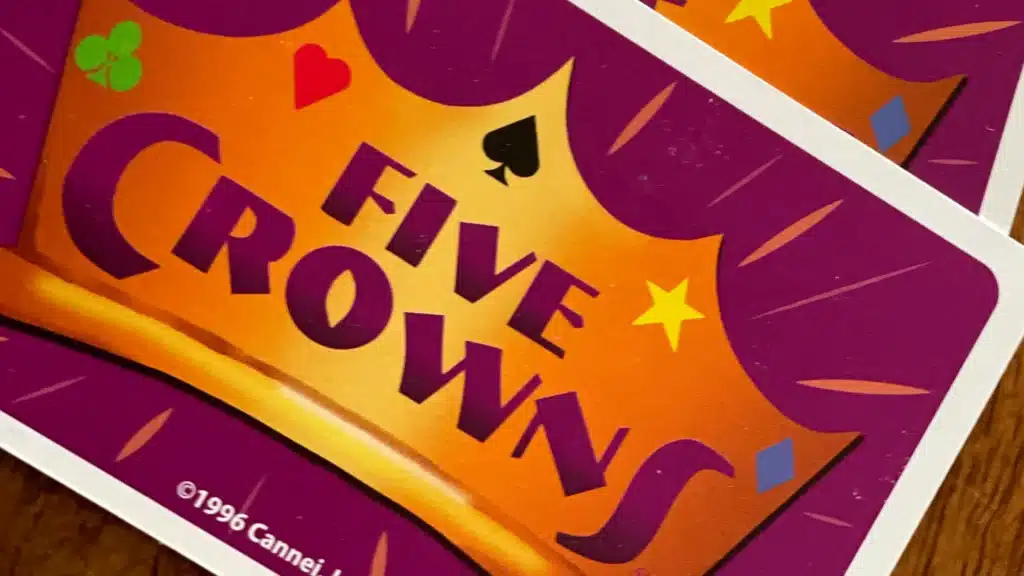Five Crowns is a popular card game that is played with a specialized deck. Here’s a basic overview of how to play:
Table of Contents
ToggleObjective:
The objective of Five Crowns is to score the lowest number of points over a series of rounds.
Setup:
- Shuffle the deck of cards. The deck consists of 116 cards, including 5 suits with cards numbered 3 through 13, and three jokers.
- Deal each player 11 cards if there are 2-3 players, 9 cards if there are 4-6 players, and 7 cards if there are 7 or more players.
- Place the remaining cards in the center of the table to form the draw pile. Flip the top card over to start the discard pile.
Gameplay:
- Starting the Game: The player to the left of the dealer goes first. On each turn, players draw one card from either the draw pile or the discard pile and then discard one card.
- Forming Sets: The goal is to form sets and runs with your cards. Sets are groups of cards with the same number but different suits (e.g., 3 of hearts, 3 of clubs, 3 of diamonds). Runs are sequences of consecutive numbers in the same suit (e.g., 4, 5, 6 of hearts).
- Wild Cards: In each round, a certain number of cards are designated as wild cards. The number of wild cards changes with each round, corresponding to the current round number. For example, in the first round, 3s are wild, in the second round, 4s are wild, and so on until the final round where Kings are wild. Jokers are always wild. Wild cards can be used to represent any card needed to complete a set or run.
- Ending the Round: The round ends when a player can form sets and runs with all of their cards, with one card remaining to discard. Once a player discards their last card, the round ends, and all other players get one more turn. Players score points based on the cards left in their hands, with wild cards having a higher point value.
- Scoring: At the end of each round, players score points for the cards remaining in their hands. Numbered cards are worth their face value, while face cards (Jacks, Queens, Kings) are worth 10 points, and Jokers are worth 15 points. The player with the lowest score after all rounds are completed wins the game.
- Multiple Rounds: The game consists of a total of 11 rounds, with the wild card changing each round.
- Variations: There are various house rules and variations that players may adopt, such as allowing players to draw from the discard pile, setting a minimum score to go out, or using more than one deck for larger groups.
Winning:
The player with the lowest cumulative score after all 11 rounds are completed wins the game.
Strategies and Tips:
- Prioritize Wild Cards: Since wild cards change with each round, it’s essential to prioritize using them effectively. Try to save wild cards for completing sets or runs that are harder to achieve with regular cards. However, don’t hold onto them too long if you have the opportunity to use them to go out and end the round.
- Keep Track of Discards: Pay attention to the cards other players are discarding. If you notice a player discarding cards that you need, it may be worth picking up cards from the discard pile, even if it means breaking up a potential set or run in your hand. Conversely, be mindful of discarding cards that may be useful to your opponents.
- Maintain Flexibility: While it’s essential to work towards completing sets and runs, try to keep your hand flexible. Don’t commit too early to a specific combination of cards, especially if it means passing up opportunities to pick up useful cards from the draw or discard pile.
- Strategize with Jokers: Jokers are powerful wild cards and can be used to complete sets or runs in creative ways. Consider saving them for situations where they can help you go out or disrupt your opponents’ plans. However, be cautious about relying too heavily on jokers, as they are worth more points when left in your hand at the end of the round.
- Block Opponents: Pay attention to the cards your opponents are collecting and try to block them from completing sets or runs. If you notice a player collecting cards of a specific suit or number, consider discarding cards that they may need or using wild cards to complete sets or runs that they are trying to achieve.
- Plan Ahead for Future Rounds: As rounds progress and the wild card changes, start planning ahead for future rounds. Try to collect cards that will be useful in upcoming rounds while also focusing on completing sets and runs in the current round. This foresight can give you a strategic advantage as the game progresses.
- Timing is Key: Knowing when to go out can be crucial in Five Crowns. While it’s tempting to go out as soon as possible to minimize points, sometimes it’s better to wait until you have a lower-scoring hand or until you can block your opponents from going out. Balancing risk and reward is key to successful timing in the game.
By incorporating these strategies into your gameplay, you can improve your chances of success in Five Crowns and outmaneuver your opponents to achieve the lowest score possible.






